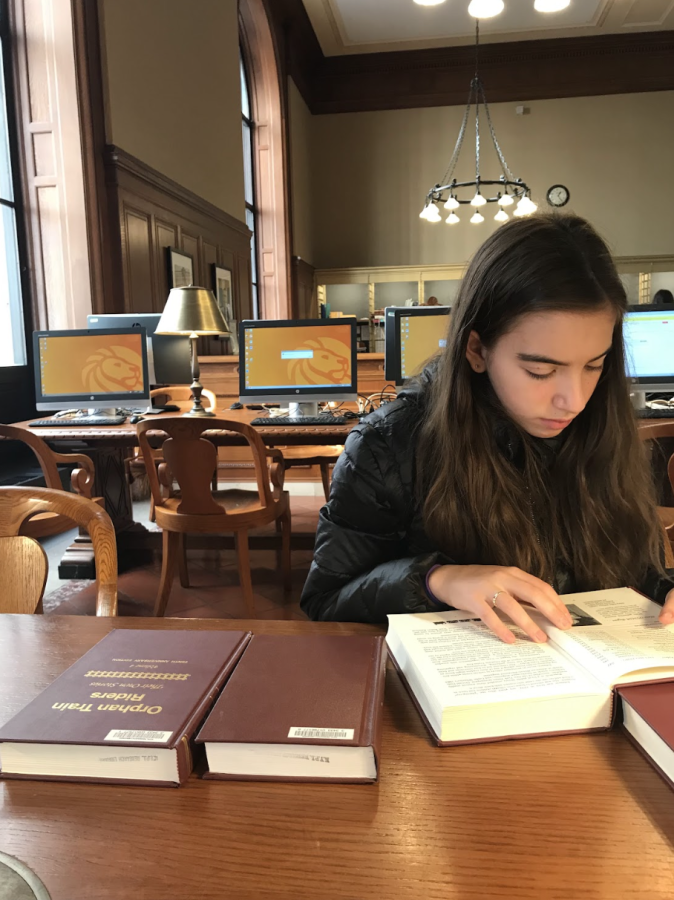Senior Spotlight: June Dorsch
June 15, 2023
Poly Senior June Dorsch has been an active participant in History Club, bringing the club to national tournaments, achieving remarkable success, and leaving a lasting impact on her peers. Though she has a passion for history and research, Dorsch didn’t always plan on joining the club. Despite her initial skepticism, Dorsch’s introduction to the club in eighth grade proved to be a turning point that ignited her passion for history and research. Her dedication and enthusiasm for the subject matter have not only earned her national recognition, but also led her to become an influential mentor and leader within the club.
Reflecting on her first encounter with the History Club, Dorsch admitted, “Honestly, it originally sounded lame to me.” However, a fortuitous turn of events led her to attend the first meeting, which ultimately captivated her interest. Recognizing the transformative power of her own experience, she explained that “whenever I try to pitch the club to students at the club fair and other events, I always make sure to tell them that I originally didn’t want to do it. History wasn’t my favorite class. There were a million reasons why I shouldn’t have wanted it, but I ended up loving it,” she said. Though she was unsure about the club in the beginning, giving the unfamiliar a chance completely changed her academic career.
Dorsch explained how the History Club creates a divide between her personal interests and academic work. “I find it interesting because I get to learn about things that I wouldn’t typically learn about in school, and I often find my History Club work more interesting than my schoolwork,” she laughed. Dorsch attributes her growth as a writer and researcher to her involvement in the club, emphasizing that it has equipped her with essential skills, such as crafting papers and developing theses.
In her junior year, Dorsch’s dedication and hard work paid off when she achieved recognition at a National History Day event, where she was a finalist and won the Women’s History Prize at the national level. Her project shed light on the forced sterilization of indigenous women by the U.S. government in the 1970s and their efforts to bring an end to such practices. While winning awards was a significant accomplishment for Dorsch, her love for History Club stems from her genuine passion, rather than the pursuit of accolades. “I never really got big awards until junior year and I found it just fine. I never felt really disappointed. I felt just as excited when William [Ling-Regan] won at Nationals, as I felt when I got an award at Nationals,” she explained.
In her senior year, Dorsch won the New England Society Book Award for Excellence in the Study of History at Poly. Despite her impressive achievements, Dorsch’s drive and motivation comes from her passion for the subject, rather than the prospect of receiving awards. “Honestly, being excited for my peers is just as exciting for me to get an award. I think it’s nice to have recognition, but it’s really the collaboration and the process that’s more exciting for me,” she said.
For her senior year, Dorsch made the difficult decision to step back from actively participating in the club. Prioritizing her college applications and assuming the role of mentor to younger club members, Dorsch sought to ensure the continued growth and success of the History Club. “It felt really weird to not write a paper this year, I really didn’t want to say no. But, I decided that I wouldn’t have been able to do a paper that was up to my standard and quality like it would have been a bad paper if I had written it,” she said. While she initially struggled with the idea of not writing a paper herself, she redirected her energy towards assisting her peers with their own projects.
Junior William Ling-Regan, opinions editor for the Polygon and new president of the History Club, testified to Dorsch’s guidance and leadership. “She’s helped me and the other club members with our [projects], giving us suggestions, teaching us new skills, and making sure we’re all ready for the contest,” Ling-Regan said. “She also leads club meetings, recruits new people, and has made History Club into a really fun environment of talking, laughing, and working together. We wouldn’t have History Club without June.”
Although it was initially challenging for Dorsch to take a step back, it proved to be the right decision in the end. “I decided, okay, I’m going to end on a high note. I had just gotten to Nationals, which was the first time I had ever done that. So I was just really happy to end my Poly History Club career with a win that I was really proud of,” Dorsch said.






































